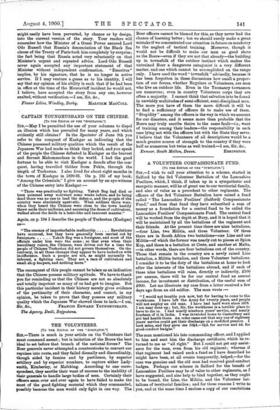THE VOLUNTEERS.
[To TRY EDITOR OF THE "SPECT4TOR:1
SIB,—There is much in your article on the Volunteers that must command assent; but is imitation of the Boers the best ideal to set before that branch of the national forces ? The Boer generals never attempted a counterstroke to convert our repulses into routs, and they failed dismally and discreditably, though aided by famine and by pestilence, by superior artillery and by superior numbers, to capture either Lady- smith, Kimberley, or Mafeking. According to one corre- spondent, they ascribe their want of success to the inability of their generals to handle large bodies of men. Certainly their officers seem over and over again to have failed to make the most of the good fighting material which they commanded, possibly because the men would only fight in one way. The
Boer officers cannot be blamed for this, as they never had the chance of learning better ; but we should surely make a great mistake if we concentrated our attention in future on musketry to the neglect of tactical training. Moreover, though it would not be difficult to make our men as good shots as the Boers—even if they are not that already—the building up in townsfolk of the outdoor instinct which makes the untrained Boer a dangerous antagonist is a very different matter, and one which cannot be accomplished on the range only. I have used the word" townsfolk" advisedly, because it has been forgotten in these discussions how small a propor- tion of our forces, whether Regulars or Volunteers, are men who live an outdoor life. Even in the Yeomanry townsmen are numerous; even in country Volunteers corps they are often a majority. I cannot think that salvation is to be found in unwieldy multitudes of semi-efficient, semi-disciplined men. The more you have of them the more difficult it will be to find a sufficiency of officers fit to make use of them. "Stupidity" among the officers is the way in which we account for our disasters, and it seems more than probable that the Boers may truly ascribe theirs to the same fault—i.e., want of training among their leaders—the responsibility in each case lying not with the officers but with the State they serve. I believe that the Volunteers of all descriptions would be a much greater source of strength to the country if they were half as numerous but twice as well trained.—I am, Sir, &c., Exmoor, South Molten, Devon. EBRINGTON.


































 Previous page
Previous page